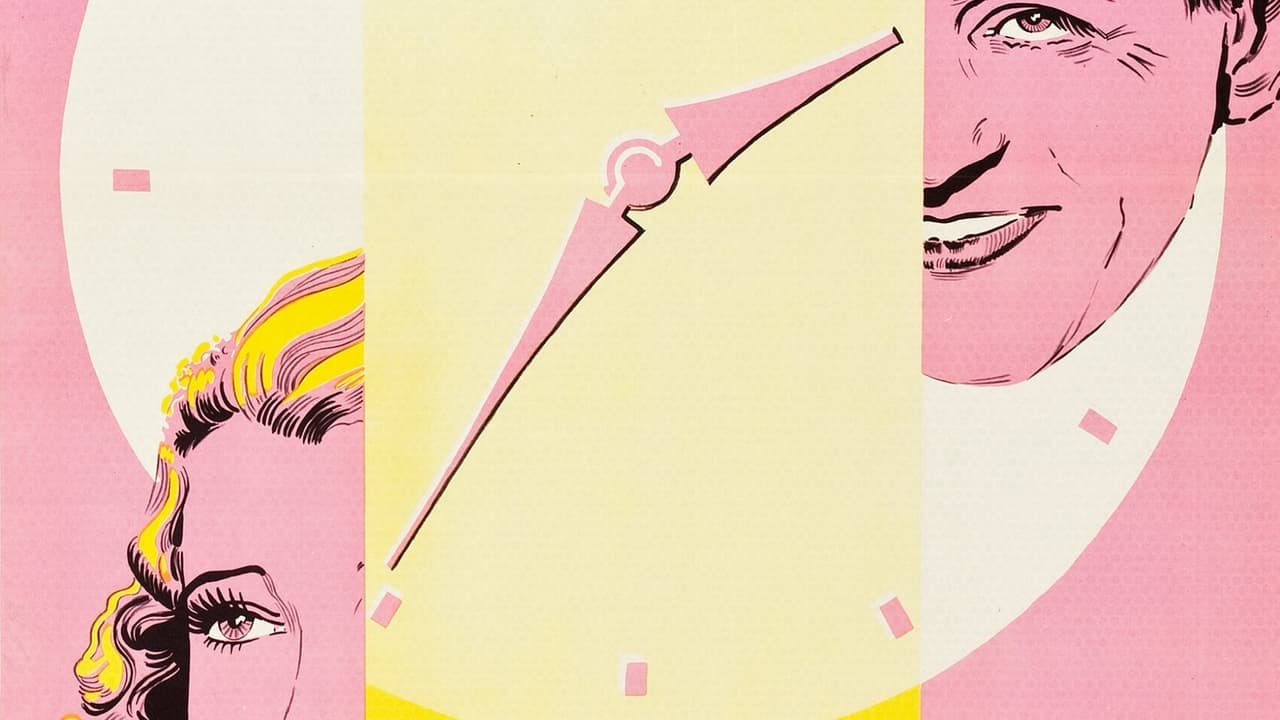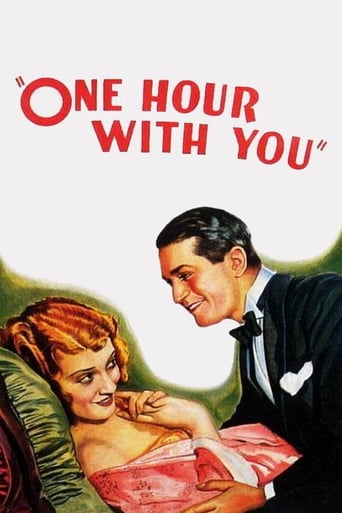Manthast
Absolutely amazing
Matrixiole
Simple and well acted, it has tension enough to knot the stomach.
Sarita Rafferty
There are moments that feel comical, some horrific, and some downright inspiring but the tonal shifts hardly matter as the end results come to a film that's perfect for this time.
Fulke
Great example of an old-fashioned, pure-at-heart escapist event movie that doesn't pretend to be anything that it's not and has boat loads of fun being its own ludicrous self.
JohnHowardReid
"One Hour With You" which seemed so fast and so risqué when I first saw it back in 1955, now looks somewhat slow and even tame. Nonetheless, there is still a lot that provides amusement and solid entertainment in the film. If the central situation is no longer as amusing as it was and if the film seems somewhat stage-bound by an excess of dialogue (some of it delivered at a rather slow pace), there is still some witty lines and ingratiating performances — particularly by Maurice Chevalier, Genevieve Tobin, Charlie Ruggles and in a brief appearance at the very beginning of the film, George Barbier. Mr. Young is agreeable but belongs to the slow delivery school and as for that arch songstress, Jeanette MacDonald, she seems to have strayed into this confection from an altogether different film, her acting is too studied and her singing too operatic to harmonize with the other members of the cast. Still, once accepted, she is not too much of a liability. Chevalier is perfect, both in song and performance, and has just the right light yet mock-serious approach to both. The songs are entrancing and the orchestrations a delight — thank heavens Lubitsch uses them and other background music to underscore most of the action. When there is no music, the proceedings are sometimes rather heavy going.Lubitsch fans will revel in this film. There are plenty of examples of his famous touch: characters walking up and down stairs, and especially his use of off-screen action, or bits of business like Chevalier and MacDonald switching the light on and off in their bedroom.The costumes are dated but attractive. The soft focus photography shines on a properly proportioned theatre screen but does not come across so well on TV. The songs, music and orchestrations are feet- tappingly delightful, the art direction is attractive and production values leave nothing to be desired.
lasttimeisaw
Lubitsch's musical remake of his THE MARRIAGE CIRCLE (1924), with George Cukor as the original director, another case of creativity discord for insiders to dig, stars Maurice Chevalier and Jeanette MacDonald as a happily married middle class couple. It comes off as an accomplished guidance of how to manage your marriage while encountering flirtation or crazed suitors, a tad old school but it is pure fun. Constantly breaking the fourth wall with self-revealing asides, the smooth-talker Chevalier's obtrusive French accent and mellow chanson are contagiously prepossessing, an honest man cannot withhold his feelings towards a seductress (Tobin), his wife's best friend, on the other hand, a demure MacDonald, famous for her high-pitch soprano lilt, is an excellent option to cast as his high-strung wife, who in turn is the love interest of his husband's best friend (Ruggles), but generally she only fences with him and only becomes intimate with him as an eye for an eye and a tooth for a tooth to Chevalier's philandering. So see the double standard here? Wife is not allowed to exude her real affection toward a third man while husband is granted full amnesty since Chevalier asks in our face "what will you do?", it's merely biological. But it is made in 1932, what do we expect? One singling-out scene is the awkward moment between Chevalier and Tobin's divorce-seeking husband (Young) when they first meet, Young's self-claim of himself as a man with absolute no sense of humour puts a preposterous veil of parody in this chamber comedy, all 6 main characters are well-selected, Genevieve Tobin is a natural force as a temptress with her heavily eye-lined vixen eyes, moreover, her singsongy communication with her husband is so naturalistically phoney. The mockery of woman's self-praising instinct is largely exculpatory, all the way, the film possesses an uplifting comical rhythm without overblown theatricality, and the musical numbers are soothingly intoxicating, you can have a wonderful one hour (and a bit more) with it.
mark.waltz
Husband Maurice Chevalier and wife Jeanette MacDonald are a happy couple discovered necking in a Parisian park and cannot make the police officer believe that indeed, they are a married couple. After all, what French married couple necks out in public among the single people being chased out by the moralistic police in a slightly amoral society? But indeed, Chevalier and MacDonald are happy, that is until MacDonald's flirtatious old school chum (Genevieve Tobin) shows up with her extremely serious husband (Roland Young, obviously cast against type.) Chevalier's best pal (Charles Ruggles, cast in type) has his eyes on MacDonald even though he was Chevalier's best man at their wedding. All comes out at a lavish dinner party, and afterward, Young names Chevalier in a divorce suit.This is romantic musical comedy at its glamorous best, beautifully directed by Ernest Lubitsch with a magnificent song score to boot. The title song and "Three Times a Day" (a song about taking medication sung by Chevalier while Tobin flirts) are wonderfully fun, and "Oh, That Mitzi!" is filled with innuendo. Everything is fixed easily of course, but not before lots of pre-code no-nos occur. The stars spend part of the film speaking directly to the audience, which greatly adds to the film's charm.
William James Harper
You can have the best directors, costumes, set designs and musical score in the world, but nothing is going to take away from the fact that this movie celebrates infidelity and makes light of it. As such, it only goes to show that the values of Hollywood film makes haven't changed that much since the 30s. No wonder the Hayes Code put a halt to this moral decay if this is the sort of stuff that was being cranked out. It's not "sophisticated" or "clever" as those who have no moral compass would have you believe. It's immorality glorified at worst or at the very least dismissed as nothing serious enough to break up a marriage.I was expecting a light delightful musical instead what I got is an improbable plot, characters totally unbelievable and a music that was thoroughly forgettable. This "gem" can stay buried forever as far as I am concerned. What a total let down.

